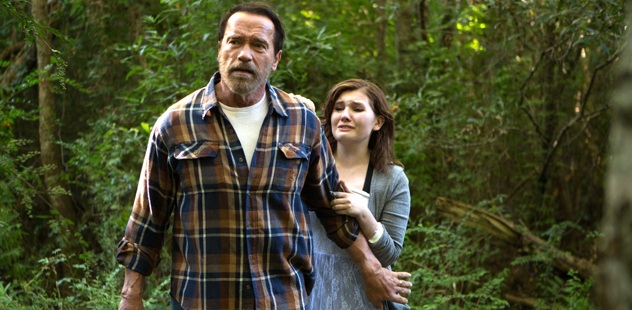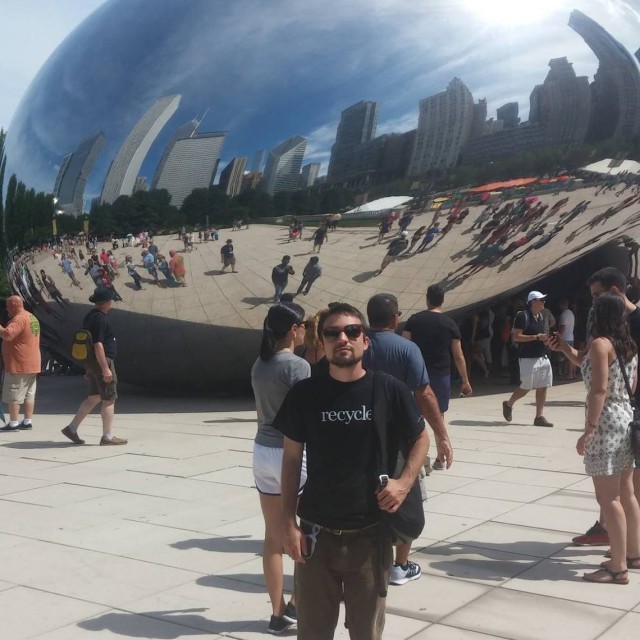
Maggie
Rated PG-13 | {3 out of 5 stars}
Are there any narrative particulars that have yet to fall within the scope of the zombie genre? Over the years in which the undead have held a shambling sway over the popular imagination, they have been employed in social satires (Dawn of the Dead), exploitative romps (Return of the Living Dead), political dramas (World War Z), slapstick comedies (Shaun of the Dead), teen comedies (Warm Bodies) and semi-cuddly, boy-and-his-dog fables (Fido). But it is a rare thing when a zombie story slows down in the midst of all the terrified running to focus on some of the keenest emotions surrounding the idea of the “dead”: grief and loss.
AMC’s The Walking Dead is by far the most successful contender in this realm, managing to explore these themes regularly through a cast of characters all coming to terms with the grieving process between scenes of gratuitous head-exploding. Maggie takes it a step further, doing away with most of the gory spectacle to zero-in on a personal tale of loss and one’s powerlessness to save those close to them. It may not be as compelling as its odd choice of leads (Arnold Schwarzenegger and Abigail Breslin) would have you believe. However, for a certain audience, Maggie can be a poignant study in despair and the experience of terminal illness that stands out from the mindless excesses of the sub-genre.
Breslin portrays the title character, a teen resigned to her fate after being bitten by a human infected with undead-like attributes. (Special note: the name of the disease is “Necroambulist,” basically a mash up of the terms “walking” and “dead.”) Unlike most zombie lore, the symptoms here reveal themselves gradually, and a sympathetic doctor allows Maggie to return to her family’s rural homestead in the care of her father, Wade (Schwarzenegger) and her wary stepmother. Local law enforcement has provided a timetable for patients to be returned to quarantine, but it is clear that Wade will attempt to hold on to his daughter at all costs, though her outcome is certain. Here Schwarzenegger plays against type as a man inert in his hopelessness. When he takes up a shotgun to ward off neighborhood cops checking in on the status of the infected, we see a ghost of his traditional Hollywood persona—the relentless, indestructible savior—but in the end he is crippled by his inability to do anything heroic for Maggie.
The background Maggie is set against isn’t a chaotic, humanitarian crisis or a post-apocalyptic frontier: it is a lost cause, a plague-stricken community going through the motions as the population continues to dwindle. Every minute of this film emits despair, from the ravaged countryside blighted with burnt crops, to the design of the zombies themselves—nearly motionless, dripping with a tarry liquid like souls in a tormented limbo. They are not so frightening as they are pitiful, a reminder that cruel happenstance can overtake any of us.
Breslin’s understated performance is at times upstaged by her increasingly morbid appearance as her character’s condition worsens, but there are numerous moments where she exhibits true strength of character, showing echoes of the high-spirited girl Maggie was before the events of the movie occurred. It is an unenviable task as an actor to create pathos while simultaneously portraying someone losing their humanity, and for the most part, she succeeds. A subplot halfway through the film in which she meets with her old group of friends for the last time and speaks with a likewise infected boy (Bryce Romero) is an affecting centerpiece, perhaps the one truly life-affirming moment in a film otherwise preoccupied with letting life go.
The overwhelming emphasis on death and dying becomes tedious at times, but also provides a striking counter to our tendency to force an uplifting message on to death. Sometimes there is nothing to be gained from the end of a life. Unlike, say, The Fault in Our Stars, death isn’t always about making those last moments count. Sometimes, there is only a slow, downhill slide, with only a sense of duty to keep us from letting our grief take us over while making end-of-life preparations for another. If that sounds unbearably glum, then perhaps Maggie is not a journey you want to take.


Comments